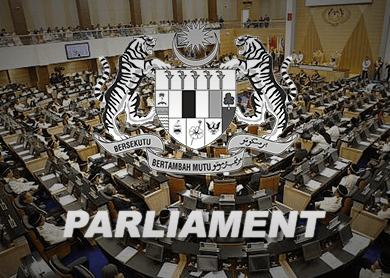
KUALA LUMPUR: Instead of fulfilling their oaths to serve the electorate, members of parliament (MPs) have abdicated their responsibilities to their political masters, constitutional lawyers said, warning that the nation and its people will ultimately suffer if the lawmakers fail to perform their duties.
They said it appears that members of the Dewan Rakyat mechanically administer their oaths to discharge their duties, including protecting the Federal Constitution.
Senior lawyer Datuk Dominic Puthucheary said the Dewan Rakyat had failed to play its constitutional role because political parties had taken control of the house and turned it into a “Dewan Parti” (political hall).
“Representatives to the Dewan Rakyat are elected by voters, but the elected have given their loyalties to political leaders, and the august body has become a Dewan Parti,” said the 82-year-old, who was a one-term Nibong Tebal MP from 1995.
He said most elected representatives never understand their roles or bother to find out what they are expected to do as prescribed in the national charter.
“For many, it is a career and not to perform a public duty as lawmaker,” he said in response to an impassioned speech by Gua Musang MP Tengku Razaleigh Hamzah to his fellow members to put the nation and the people above anyone else.
The 222 Dewan Rakyat members began sitting yesterday for a month to discuss the affairs of the state.
In the March sitting, when debating the royal address, the Kelantan prince, fondly known as Ku Li, said Malaysia is in a state of political and economic gridlock, and this could only be unlocked by Dewan Rakyat members.
He expressed concern over the mounting debt incurred by 1Malaysia Development Bhd as a result of obtaining unauthorised loans as well as the implementation of the goods and services tax.
“We are facing an unprecedented challenge to fulfil the pledge to serve the nation and the people.
“This is because the truth is that the power of the Dewan Rakyat has constitutionally shifted to the leadership of the political party,” said the 77-year-old Tengku Razaleigh, who had been elected without fail since 1974.
“The concentration of that power in any individual is unconstitutional. That is not what constitutional democracy is about.
“Therefore, the members of the Dewan Rakyat have to decide whether they want to fulfil the pledge that they have taken or abdicated their responsibilities to a power outside the Dewan Rakyat,” said Tengku Razaleigh.
Dominic said there is no doubt that Tengku Razaleigh hit the nail right on the head in his speech, but admitted there needs to be a revamp of the entire system of governance.
He also expressed dismay over the parochial attitude of representatives from Sabah and Sarawak, who are more concerned about their territories and interests instead of national issues.
Lawyer R Kenghadharan said any parliamentarian, who is unable to adhere to noble values, would be a misfit and should vacate office as he or she is a gross liability to the democratic process.
“Such incompetent parliamentarians will seriously damage the democratic process and governance — and we have many of those.”
“Unless the people rise to save this institution, we risk our current system of governance collapsing completely and Malaysia becoming a failed state,” he added.
Lawyer Edmond Bon said the constitutional idea is that elected representatives vote according to their intellect and conscience to be accountable to the people.
Bon said MPs could not act independently, like introducing a motion of no-confidence against the leader of the house, as the party whip is enforced to maintain discipline.
He said what was articulated by Tengku Razaleigh had been advocated by civil society for the removal of the concentration of power within the hands of an individual or selected few.
Bon also said the proportionate representation system of MPs — based on the percentage of popular votes obtained — should be looked into when parliamentary reforms are undertaken, as done in the West.
“We should also allow citizens direct access to the Dewan Rakyat if a respectable number signed a petition to debate public interest issues,” he added. — The Malaysian Insider
This article first appeared in The Edge Financial Daily, on May 19, 2015.